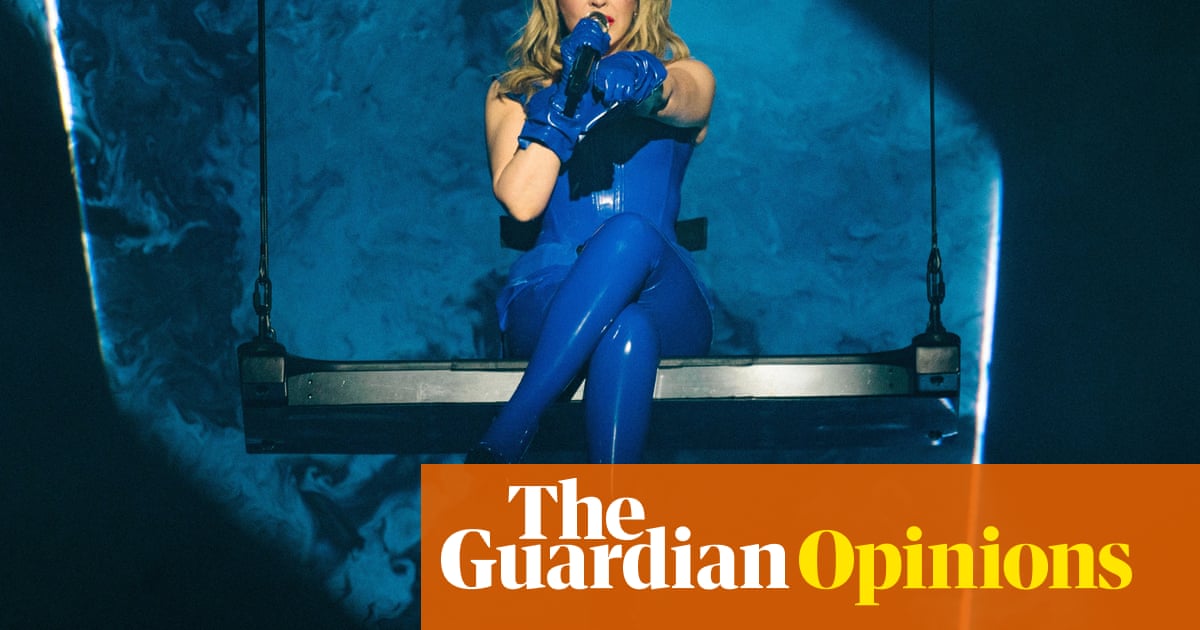Kylie Minogue’s currentTension tour is a glorious spectacle. Dancers prowl around geometric staircases in weird hats, which feels delightfully Pet Shop Boys. There is a disco ball big enough to permanently dazzle every audience member. One visual shows a noirish film of Ms Minogue as a sort of heartbreak-vanquishing detective; a billboard in her rainy street scene incorporates the location of each tour date to ask: “Feeling lonely in Sheffield? Call Kylie …” And there she is in the middle of it all, resplendent in blue PVC; a spangly red jumpsuit; a kaftan-ish thing sewn together from what looks like neon police tape, emblazoned with the classic jagged Kylie heartbeat monitor logo.
Kylie is one of our most generous performers: not above adding The Loco-Motion to the setlist following audience demand, its youthful silliness contrasted with Dancing, a gorgeous disco-country song about mortality. The expansiveness of the show made it all the more galling to be forced to partially witness it through the digital camera of the man sitting next to me, who spentthe entire gig– and I meanevery single second of it– training his priapic lens on Kylie through wobbly 10x zoom.
Everyone has their phone out at gigs now, particularly big pop shows: it’s an unavoidable fact of live music. To look down from our side-stalls seats at any point during the show was to see a glittering of little rectangles, and that’s fine. Teenagers often get the blame for this, but Kylie’s is a fairly middle-aged crowd. I’m not immune either – I usually limit myself to a single gig pic, just so the event lives in my camera roll, but I took maybe a dozen of all the exciting set pieces.
But there is something profoundly creepy about Digital Camera Guy, a fixture of most gigs that feature a female performer. I’ve stood next to this – always middle-aged or older – man dozens of times, watching him maintain a shakily tight focus on the women on stage with his ancient silver Olympus, and wondering what on earth he’s going to do with those photos and footage later. Whether his intentions are sleazy or simply trainspottery, his ceaseless scrutiny feels unsettling for female and gender-nonconforming audience members and musicians.
As performers in a paid-for, public setting, they’re obviously there to be looked at, but there’s a difference between a reciprocal exchange with an understanding and respectful audience, and feeling monitored. The inference is that women only exist here to be surveilled, perceived as visual stimuli at best, sex objects at worst. It’s bad enough realising that someone is staring at you creepily in public – behaviour that has been prohibited on London’s public transport network since 2022 – let alone, I imagine, noticing yourself being watched so intently when you’re trying to stage a show on your own terms. In this dynamic, it’s the performer who generally commands the room, but the perpetually invasive lens undermines that power, reminding them that they’re nothing but an object to be captured.
I’ve spoken to plenty of female performers, some of them distressingly young, who hate the sight of DCG but feel they can’t speak out about him for fear of alienating paying fans or being perceived as ungrateful, uppity bitches. I’ve also spoken to several of my own male friends in their 40s and 50s who worry about being tarred with the same brush, who fear going to gigs alone or standing anywhere near the front in case they’re perceived as pervs who haven’t come to listen to the music. In case you think I’m overstating this, one of those friends texted me saying he’d stood next to a DCG atWet Legin London this weekend, and watched in horror as the man kept unabashedly zooming in on the band’s legs and bums.
I’m sure most DCGs are not taking photos to get off to later (you’d have a job, through all the pixels). But either way, the lack of self-awareness makes so many other people in the crowd profoundly uncomfortable, leading them to question their entirely equal place in this environment. I felt icky every time I accidentally brushed the guy sitting next to me on Friday. I’ve had Kylie’s rapturous encore closer Love at First Sight as an earworm since then, but that feeling of unease is the thing I really can’t get out of my head. DCG: I beg you, stop it.
